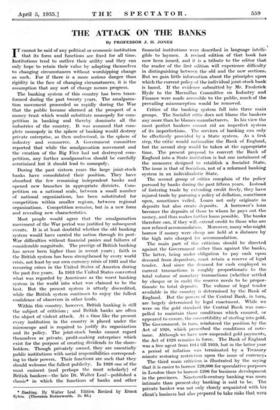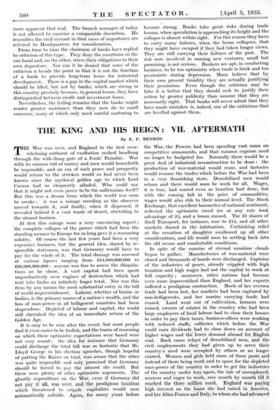THE ATTACK ON THE BANKS
By PROFESSOR J. H. JONES
IT cannot be said of any political or economic institution that its form and functions are fixed for all time. Institutions tend to outlive their utility and they can only hope to retain their value by adapting themselves to changing circumstances without worshipping change as such. For if there is a more serious danger than rigidity in the face of changing circumstances, it is the assumption that any sort of change means progress.
The banking system of this country has been trans- formed during the past twenty years. The amalgama- tion movement proceeded so rapidly during the War that the public became alarmed at the prospect of a money trust which would substitute monopoly for com- petition in banking and thereby dominate all the industries of the country. It was assumed that com- plete monopoly in the sphere of banking would destroy private enterprise, as then understood, in the sphere of industry and commerce. A Government committee reported that while the amalgamation movement and the creation of the Big Five had not destroyed com- petition, any further amalgamation should be carefully scrutinized lest it should lead to monopoly.
During the past sixteen years the large joint-stock banks have consolidated their position. They have absorbed the few remaining independent banks and opened new branches in appropriate districts. Com- petition on a national scale, between a small number of national organizations, has been substituted for competition within smaller regions, between regional organizations. Competition remains, but in a new form and revealing new characteristics.
Most people would agree that the amalgamation movement of the War period was justified by subsequent events. It is at least doubtful whether the old banking system would have carried the nation through its post- War difficulties without financial panics and failures of considerable magnitude. The prestige of British banking has never been higher than in recent years ; faith in the British system has been strengthened by every world crisis, not least by our own currency crisis of 1931 and the recurring crises in the United States of America during the past five years. In 1913 the United States converted what was regarded by Americans as the worst banking system in the world into what was claimed to be the best. But the present system is utterly discredited, while the British system continues to enjoy the fullest confidence of observers in other lands.
Within this country, however, British banking is still the subject of criticism ; and British banks are often the object of violent attack. At a time like the present every institution in the country is placed under the microscope and is required to justify its organization and its policy. The joint-stock banks cannot regard themselves as private, profit-making enterprises which exist for the purpose of creating dividends to the share- holders. Though privately owned, they are essentially public institutions with social responsibilities correspond- ing to their powers. Their functions are such that they should welcome the fullest publicity. In 1926 one of the most eminent (and perhaps the most scholarly) of British bankers—the late Dr. Walter Leaf—published a classic* in which the functions of banks and other Banking. By Walter Leaf. Edition Rovised by Ernest Sykes. (Thornton Butterworth. 2s. 6d.) financial institutions were described in language intelli- gible to laymen. A revised edition of that book has now been issued, and it is a tribute to the editor that the reader of the first edition will experience difficulty in distinguishing between the old and the new sections. But we gain little information about the principles upon which the current policy of the individual joint-stock bank is based. If the evidence submitted by Mr. Frederick Hyde to the Macmillan Committee on Industry and Finance were made accessible to the public, much of the prevailing misconception would be removed.
Critics of the banking system fall into three main groups. The Socialist critic does not blame the bankers any more than he blames manufacturers. In his view the most perfect bankers cannot rid an imperfect system of its imperfections. The services of banking can only be effectively provided by a State system. As a first step, the critic would nationalize the Bank of England, but the second step would be taken at the appropriate time. The present proposal to convert the Bank of England into a State institution is but one instalment of the measures designed to establish a Socialist State. The issue is that of Socialism, not of a reformed banking system in an individualistic State.
The second group of critics complain of the policy pursued by banks during the past fifteen years. Instead of fostering trade by extending credit freely, they have injured trade by pursuing a policy of deflation, sometimes open, sometimes veiled. Loans not only originate in deposits but also create deposits. A borrower's loan becomes the deposits of those to whom he pays out the money, and thus makes further loans possible. The banks therefore can, if they will, extend credit to those who are now refused accommodation. Moreover, many who might borrow if money were cheap are held at a distance by the high rate charged for accommodation.
The main part of this criticism should be directed against the Government rather than against the banks. The latter, being under obligation to pay cash upon demand from depositors, must retain a reserve of legal tender. And since the demand for cash employed in current transactions is roughly proportionate to the total volume of monetary transactions (whether settled by cheque or in cash) the reserve needs to be propor- tionate to total deposits. The volume of legal tender available in the country is determined by the Bank of England. But the powers of the Central Bank, in turn, are largely determined by legal enactment. While we were on the gold standard the Central Bank was com- pelled to maintain those conditions which ensured, or appeared to ensure, the convertibility of sterling into gold. The Government, in turn, reinforced the position by the Act of 1928, which prescribed the conditions of note.. issue. Although we have now suspended gold payments, the Act of 1928 remains in force. The Bank of England was a free agent from 1914 till 1919, but in the latter year a period of inflation was terminated by a Treasury minute restoring restriction upon the issue of currency.
The third main criticism is illustrated by the saying that it is easier to borrow £20,000 for speculative purposes in London than to borrow £200 for business development in the provinces. Nineteenth-century banking was more intimate than present-day banking is said to be. The private banker was not only closely acquainted with his client's business but also prepared to take risks that were more apparent that real. The branch . manager of today is not allowed to exercise a comparable discretion. He resembles the civil servant in that cases of importance are referred to Headquarters for consideration.
From time to time the chairmen of banks have replied to criticism of this type. They deny the assertions on the one hand and, on the other, stress their obligations to their own depositors. Nor can it be denied that some of the criticism is beside the point in that it is not the function of a bank to provide long-term loans for industrial development. There is a gap in the capital market which should be filled, but not by banks, which arc strong in this country precisely because, in general terms, they have distinguished between credit and investment loans. .
Nevertheless, the feeling remains that the banks might render greater assistance than they now do to small concerns,' many of which only need careful nurturing to become strong. Banks take great risks during trade booms, when speculation is approaching its height and the collapse is almost within sight. For this reason they have to carry many failures, when the boom collapses, that they might have escaped if they had taken longer views. They arc still carrying their failures of the past. The risk now involved in nursing new ventures, small but promising, is not serious. Bankers arc apt, in conducting business, to be too optimistic when trade is brisk and too pessimistic during depression. Many believe that by their own present timidity they are actually justifying their pessimism. Even though the criticism may be false it is better that they should seek to justify their action by greater publicity than assume that they are necessarily right. That banks will never admit that they have made mistakes is, indeed, one of the criticisms that are levelled against them.











































 Previous page
Previous page